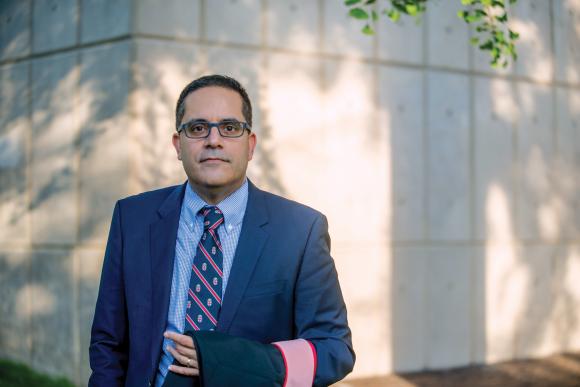PROVIDENCE, R.I. [Brown University] — When Dr. Pedro Escobar-Rodriguez, 47, moved back to his hometown of San Juan in 2013 to take care of his sick father — after long OB-GYN stints at Northwestern University and the Cleveland Clinic — he was shocked to find out how much Puerto Rico lacked in terms of healthcare. “The technology was behind, the insurance landscape more challenging, and affordable medical choices limited,” he says. He wanted not only to practice medicine there but to attain a deep understanding of the systems he’d need to upgrade services on his native island.
So he applied and was accepted to the Executive Master of Healthcare Leadership program within Brown’s School of Professional Studies. Students are working adults who come to campus only a few times over about an 18-month period; the rest of the work is done remotely. “I liked the program’s blend of finance and management with classes on policy, quality, and leadership,” says Escobar-Rodriguez, who chose it over postgraduate health-management programs at Harvard and Dartmouth. “It just felt more balanced.”

But once he was in, things got crazy. He found himself working in oncological OB-GYN at San Jorge Children’s Hospital in San Juan, performing women’s cancer-related surgeries in the middle of last fall’s Hurricane Irma, during which he all but lived at the hospital because the power was out in his own home, where he resides with his wife and kids. (He also needed the Internet at work for his many Brown papers due.) “I was going nonstop from about 5 a.m. to 3 a.m.,” he recalls. “My program director at Brown said that I could take the year off, but I wanted to graduate with my own classmates.” And he did. Commencement Weekend, he was on College Hill among 90 other Executive Master’s graduates, in not only healthcare leadership but also cybersecurity and science/tech leadership — as well as those students receiving the IE Brown Executive MBA.
He says that the program paid off big time. For its capstone project, he brokered a deal with a robotics maker to bring state-of-the-art, minimally invasive surgery equipment to San Jorge for women’s cancers. It required an intricate knowledge of payment systems, enough so that he could negotiate for the hospital to pay for the equipment per use, lease-style, since the facility couldn’t afford the $2 million cost upfront. He says he could never have worked out that deal without what he learned in the Brown program. “The hospital director said to me, ‘You’re the first physician talking to me about stuff I usually talk about only with my management team.’ I told him I was doing this master’s program.” The director then spontaneously offered him his current job: Director of Women’s Services.
Since then, he’s managed to bring robotics for minimally invasive surgery for women’s cancers to other hospitals on the island, which serve not only Puerto Ricans but patients from islands like Guadeloupe and Martinique. “I don’t want to brag,” he says, “but the equipment’s as good as at the Cleveland Clinic. And all because of this little Brown grad right here, Dr. Escobar!”
—Tim Murphy, Class of 1991

